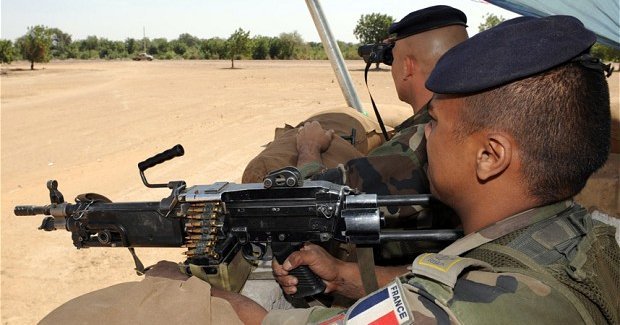On 20 January 2014, the EU pledged half a billion dollars to the CAR for immediate urgent humanitarian needs and stabilization measures according to EU Commissioner Kristalina Georgieva. At the same time, after long discussions, the EU member states finally reached a “political agreement” to send a battalion-sized EU force (up to 600 soldiers) to the CAR’s capital Bangui. Eight days later, the UN Security Council approved this “EU intervention force” (known as EUFOR RCA) unanimously under resolution 2134 with “all means necessary” to protect civilians. This is part of a larger effort to restore calm in the CAR, a country that has often been described as a “phantom state,” due to the absence of functioning institutions.
In fact, this mission is the first joint operation of the EU in six years (!). It is very modest in size and neither Britain nor Germany will contribute with troops. The announcement to send troops was welcome by the government of CAR although it is deemed as not sufficient. However, in some ways it could be a potential milestone for European military coordination that allows for humanitarian intervention to protect civilians under UN auspices.
Conflict in a “phantom state”
The decision to send a European-wide force signals a move toward broader intra-European defense cooperation during humanitarian emergencies. The mission will certainly need to reflect the complexities one has to face in a country where government institutions are basically inexistent. For more than a year, the CAR has been on edge. President François Bozizé was ousted in March 2013; his decade in power that was characterized by corruption. Michel Djotodia took office in March 2013 after Islamist Seleka rebels staged a coup following months of insurgency in the north of the country.
Fighting between Muslim Seleka rebels and Christian “anti-balaka” militias broke out in November 2013 and until today killed more than 1,000 people and has displaced nearly one million people who fled in fear of violence in a country of only 4.6 million. Certainly, the fault lines are not only along religious lines (historically, there has been no religious hatred) but it has proven to be the easiest way to describe the conflict. The violent clashes between sectarian militants have torn through the country apart. A UN official warned of the risk of genocide without a more decisive international response, although it has been stressed that never a 1994 Rwandan-like situation was in place.
A woman in power
Due to international pressure, Djotodia resigned in early January 2014, following pressure from the international community. He is followed by Bangui’s former mayor Catherine Samba-Panza who was elected transitional president of the country by a national transitional council in parliament. Now she is the third female head of state on the African continent. (In contrast, there is only one female head of state in the EU at the moment, Lithuania’s Dalia Grybauskaitė.) Samba-Panza declared that she wants to be a president for all citizens whatever their background is. The new interim president faces the huge task of bringing peace to the country and overcome the sectarian conflict. At the same time, the return of hundreds of thousands of displaced has to be facilitated so that they can go back to their villages. Finally, a functioning government has to be restored and real institutions have to be set up until the upcoming elections.
The European intervention force
Inside the EU, pressure was built up to send troops to the CAR to defend the lives of civilians. Swedish Foreign Minister Carl Bildt demanded that the EU should activate its rapid reaction force, a multinational battle-group to the CAR. However, the German foreign minister Walter Steinmeier rejected that idea. Bildt responded that battle-groups have never been used since their establishment in 2007 and if they are not deployed in such a situation, one needs to question the sense of having them at all.
Now, an “intervention force” will be sent to the CAR. The details of the EU’s operation, which could begin at the end of February, still need to be worked out. It is clear in the meantime that it will be headed by a French general and its size is expected to number around 600, smaller than the originally expected 1,000 soldiers. Other countries next to France which will send troops could be Belgium, Estonia, Finland, Lithuania, Poland, Slovenia, and Sweden. As a former French colony, the CAR is often seen as a French interest rather than a European interest. Thus, it will be important to prove for French president François Hollande to prove that humanitarian reasons and not economic interest is guiding the French leadership for this mission.
France has already deployed 1,600 troops in December 2013 – as the only European country at the time because it could not convince other EU countries, particularly Germany, to move ahead. Besides the French troops, that will not be part of the EU mission, there is an African stabilization force (MISCA) with 4,400 soldiers on the ground which will be continuously strengthened in size. The EU will have the mission in the CAR with a limited timeframe of six months and is by its nature a handover to African troops or a larger UN-led mission that might be created.
The last time European powers dispatched a major joint ground force was to Chad in 2008. In January 2013, the EU sent troops to Mali, where France had intervened, but their task was limited to training Malian forces. At the moment, the EU has 7,000 staff deployed around the world on 12 civilian missions and four military operations, including combating piracy off Somalia.
What next?
Now, it will be vital to lead reconciliation efforts and reestablish trust and the relationships between the communities. The UN’s Valerie Amos remarked that there are ongoing discussions with religious leaders. Due to the sectarian violence, this is certainly a good approach as long as the right people are there to facilitate the meetings and allow for space between the religious leaders. Already during the violence there have been efforts of such leaders as well as other community organizations to stop the violence. Such actions are certainly more helpful in the long run than any military effort. However, the insecurity and the humanitarian crisis need to be solved in the short-run.
Grassroots movement can and should be a starting point to rebuild the country. It has to be kept in mind that this conflict is not about religion as such but rather the access to resources and political legitimacy. Thus, it will be ultimately necessary to find a better way to distribute the wealth that the country has, including gold and uranium. The CAR has to hold elections by February 2015 at the latest according to the terms of a regionally-brokered peace plan. There is pressure, however, that the election should be held already during the second half of 2014 if possible and allow for a government that is backed up by the people of the CAR. The new political leaders will need to make sure to break with the past that has been characterized by corruption.
The lesson for the EU
The EU is right to be a leading force in assisting and sponsoring the rebuilding of a country that has sunk to chaos and humanitarian organizations could not deliver anymore due to the violence. Now, the EU provides combat troops and humanitarian aid to the establishment of stable state structures in the CAR with more inclusive and transparent structures.
In the future, however, the EU needs to be more proactive. In general it will be necessary to be better prepared for such combat missions and the EU cannot reacted with complete surprise to every crisis as if it would have not much an idea of what is going on in the rest of the world. A proactive instead of a reactive approach will be necessary in the future to prevent violence at the outside and by that unnecessary suffering. It should not be the former colonial power that shows combat muscle while their European partners assist in the follow-up efforts. It should be a united European approach in the cause of humanitarian good.


Follow the comments: |
|
